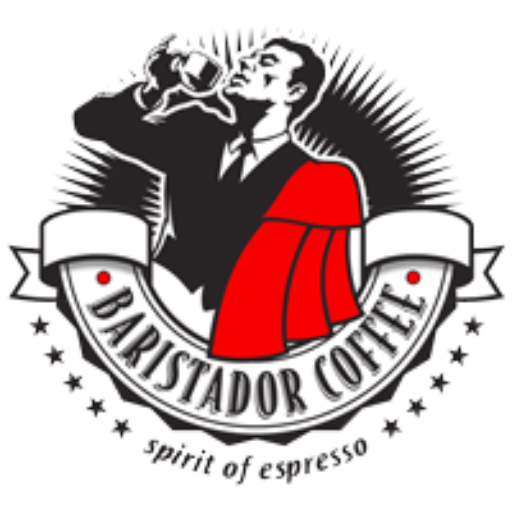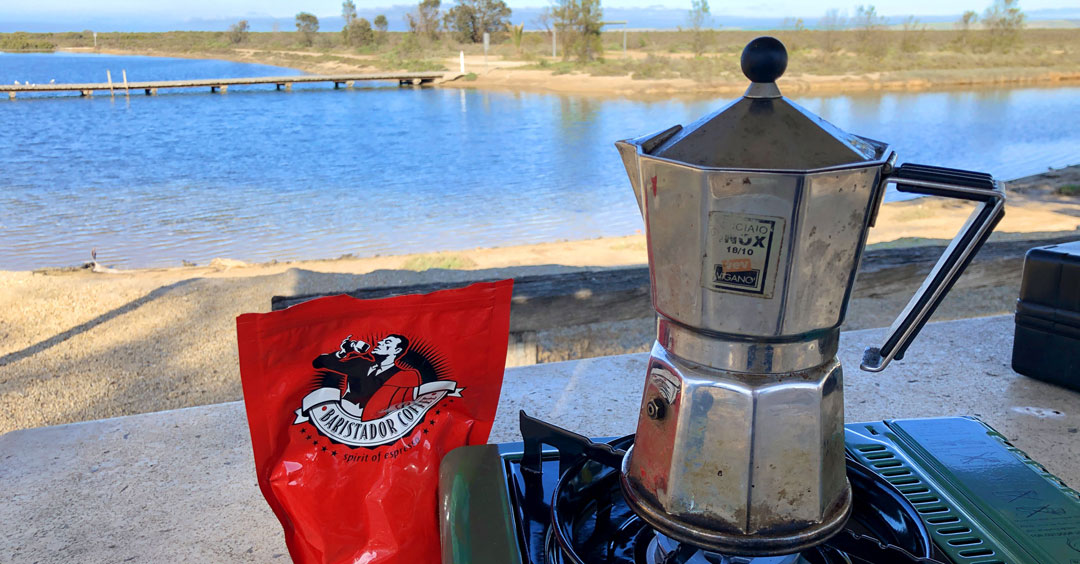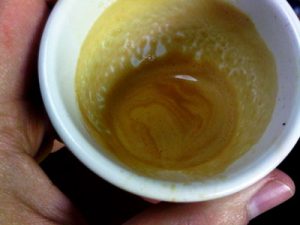Have you ever had a cup of coffee that tasted bitter? Or wondered why your coffee tastes bitter?
Chances are that as long as you are buying quality coffee, the bitterness was ‘created’ by your coffee-making technique.
A lot of research has gone in to what is responsible for reports of bitterness among some coffee drinkers.
According to Thomas Hofmann, a professor of food chemistry and molecular sensory science at the Technical University of Munich, while many people blame caffeine for coffee’s bitterness it really only accounts for 15 percent of the experience.
His research has shown that there are two chemical compounds developed in coffee as a result of roasting that lead people to ascribe bitterness to this beverage but they are also the antioxidants; something that attracts people toward coffee.
A separate review of research, carried out by McCamey, D. A.; Thorpe, T. M.; and McCarthy, J. P., Coffee Bitterness, in “Developments in Food Science”, found that Robusta beans had higher levels of these compounds than Arabica beans (Baristador coffees are all Arabica).
This latter review also pointed the finger at brewing techniques for amplifying these natural qualities in roasted coffee.
So, what am I doing that’s makes coffee tastes bitter?
Coffee experts agree that the following three principles make coffee taste bitter:
- Over-extracting your coffee
- Using water that is too hot
- Using the wrong grind size
Over-extracting your coffee
This is a trap for young players and I blame all the big name brands in coffee machines.
Over-extraction is when you pass (or ‘espress’) too much water through your coffee grounds.
Basically, once you have extracted your shot of coffee, you should STOP allowing your coffee machine to pass more water through those spent beans.
Once a shot has been extracted, water that follows draws numerous bitter compounds from deep within the grounds, compounds we should NOT be drinking.
So if you are lulled into a false sense of security by your machine which allows you to dial up a long black, you are prescribing yourself a cup of bitterness.
To get a long lack or a longer dose of coffee for a milk drink (latte, flat white, etc), simply let your machine deposit a shot of coffee into your cup and THEN add some hot water to achieve your desired length.
You will instantly notice a sweeter, milder, more rounded result.
Using water that is too hot
Just like over-extraction, water that is too hot reaches too deeply into our humble coffee grounds and leeches compounds we don’t want to leech.
This is why good cafes never serve scaldingly hot coffee.
It is also why better coffee machines give you control over water temperature.
If your machine wont allow you to dial between 92 and 96 degrees Celsius, you possibly need a new machine.
If you are plunging, allow the kettle to sit for a minute or two after boiling to allow the temperature to reduce before pouring over the coffee grounds.
Another form of over-extraction occurs when you scimp on the dose of coffee you put in your coffee device. This will become more temptiing as coffee prices rise later this year (2011).
However, short-changing your coffee device leads to your coffee extraction running thinner and more bitter much faster than expected. So always fill your coffee basket or use generous scoops when preparing plunger coffee to avoid self-sabotaging your coffee experience.
Using the wrong grind size
Baristador, like most other coffee houses, offers its blends in three different ‘grinds’:
- Whole beans – You grind these yourself and must experiment for your optimal grind size to suit your coffee device
- Espresso grind – This is a finer grind suitable for espresso machines and stovetop espresso makers (as a standby you can use this grind in a plunger)
- Plunger grind – This is a coarse grind just perfect for plunging. You CANNOT substitute this grind for espresso because the water will pass through too quickly.
I hope these notes will help you give your coffee (Baristador or otherwise) a chance to display their unique flavour profiles without being tarred by some coffee-making missteps.
PS Cleaning your coffee equipment VERY regularly will also flush away bitter residues which build up quite quickly.
Yours in the spirit of espresso
Steve Davis



Hey Steve. Thanks for the advice. This helped a lot but I still have some lingering questions that are related to my situation. I live in South America, in Ecuador. I’m an American expat and I don’t have plans of going back any time soon. In Ecuador, the coffee that I can buy in the supermarket doesn’t have classifications as to the size of the grind (except for espresso). So I don’t know the optimal grind for the press. I have a cheap little press that I recently bought and began experimenting with, but I still find that the coffee is coming out bitter. I’m not using boiling water, I keep the press clean and I’m using generous amounts of the coffee that I’ve purchased. Do you have any further advice for a beginner? It would be greatly appreciated. I don’t know if you know this, but here in South America, instant coffee drinking is rampant. I’m using the heated water from the water machine to brew the stuff that I bring from home. Please help! I need a better coffee experience!
J
Hello Jonathon, thanks for commenting. When you say ‘press’, I assume you mean a ‘plunger’ or are you referring to one of those older espresso machines in which you ‘press’ down the lever to espress the coffee? If the former, then you will need to look for a plunger grind OR consider buying just the beans and grinding the coffee yourself, coarsely. If the latter, an espresso grind should suffice.
Part of me wonders whether the blend itself might be at fault? Do you know other people using this blend who get good results? Or could you take some somewhere else to try on different apparatus?
Finally, how sad that instant coffee is all the rage in a part of the world that is hailed as one of the blessed coffee-growing regions.
Hi Jonathon, I would not generalize about the consumption of instant coffee in South America. I am Venezuelan and here instant coffee is frowned upon by people of all generations and all socio-economic levels. I know that this is the case as well in Colombia, although I would not know about other countries.
Patricia, you just restored my faith in coffee-producing, coffee-loving humankind 🙂
Hi Steve, thanks for your advice on causes of bitter coffee.I am Kenyan and a first year student at Kenyatta university ,taking a bachelor of science that is tourism management.I was revising for my end of semester exam then i found some help from your article.Thanks very much and continue with the same.
Basil, thank you for your comment. I hope you have done well in your exam.
I am honoured to hear from someone who lives in the ‘birthplace’ of coffee.
There is an email heading your way to ask you a couple more questions, if I may.
Thanks again, Steve
Hi Steve,
Thanks for the article. There seems to be an epidemic of bitter coffee in the US, at some of the finest “espresso bars” no less, and it looks like it’s tied to to a cause you don’t mention.
From what I perceive, it is the habit of baristas here to compress too much espresso, too tightly in the coffee handle. They do this almost uniformly, as if to think they are somehow achieving the ideal espresso. It stuns me that they are not instructed to use a measured amount of espresso (about 3/4ths full) and a measured press.
This, I believe is what is causing almost undrinkable espresso (sometimes too bitter to look at) at some of top premium coffee shops of the country. A particular potty given the exceptional coffee they use and the state of the art equipment they have.
Best regards,
Paul
*pitty
Thanks! “Potty” really threw me — although I can see why the word would come up in a discussion of bitter aftertaste.
Yes, Paul, there are many factors that work together. I am adjusting to a new manual machine and there is much to balance. Steve
It is sad if you see a shop not weighing out their grinds.
But on the compressing of the grounds in the portafilter, they need to be evening compressed. Otherwise the water pushing through the grounds will find the easiest way through and only go through that one area, thus over extracting those grounds and not going through the entire area.
Hi Steve,
I can alter the settings on my grinder, and have just replaced my faithful old machine with two machines after five years service (one of a different brand). In the article above you say “once you have extracted yourshot of coffee, you should STOP allowing your coffee machine to pass more water through those spent beans.”
How will I know when to stop the water passing through the beans?
Regards,
Peter
Hello Peter, sorry for the delay. While baristas get taught to time their pour, it depends n too many factors at home. I suggest experimenting. Typically, once you notice the thickness of your espresso start to thin, you have probably gone a little too long. Remember, a little shot with added water is the way to make a long black that is not bitter. Steve
hi steve, thanks for the advice. I am nawawi from Malaysia. I am using aeropress to brew my coffee and i found out that different bean type required different brew time. is it true that dark roast bean is more bitter??
Hello Nawawi
Actually, I find dark roasts to be a little sweeter if they have been roasted correctly. The biggest threat, if they are fresh, well roasted and properly ground beans, is just the common mistake of forcing too much water through the beans instead of just a shot. Steve
Hello Nawawi, yes, different bean types, bean roasts and bean grinds will all need slight differences in brew time. As to double roast being more bitter, I don’t believe that is the case but it depends upon how well the beans have been roasted, their quality to start with and your individual palate. I find the Baristador double roast brings out a sweetness and stops the more citrus and marzipan-like flavours I find in coffee that’s been more lightly roasted. All comes down to personal taste in the end.
Brilliant, thank you. Over-extracting was the cause. Amazing the taste difference now.
Do you find that using a drip coffeemaker makes bitter coffee in general? I recently moved and didn’t bring my percolator, which made a great cup of coffee. I bought a drip coffeemaker and I’m using the same beans and every cup is bitter. I’m thinking it might be because it tends to drip in the middle of the coffee and doesn’t expose all the grounds to the water.
Hi Mark, your theory sounds good. There’s only so much “goodness” one can extract from coffee, so if it is trying to extract from the same grounds over an extended period, that has got to be a recipe for disaster.
Hi Steve, thanks for your post. I am familiar with all of the points you raise but have recently encountered a problem which is proving difficult to solve. I was in the habit of using Starbucks coffee beans in my grinder and espresso machine. They worked well but I wanted to start using fresh beans, so I subscribed to a service by which I receive my beans the day after roasting. These fresh beans are causing my coffee to be very bitter, much more so than the Starbucks beans. I have tried different grinder settings, degrees of compaction and a second variety of bean. Are you aware of any reason why fresh beans might differ from a mass produced stale bean in terms of bitterness?
Hi Peter, I’ve always understood that beans need to settle a little after roasting because there is still some time required for unwanted gases to escape, etc. This is why my “roaster man” takes care to manage that before dispatching our bags. We also use one-way valves to let gases out and not in. This COULD be part of the issue, or it might be the new beans per se. Not sure if that helps. Perhaps you could try setting aside a bag next time – give it a few days before grinding. Or, better yet, if you are in Australia, why not order some Baristador and play with that? Our next group roasting closes this coming Monday at midnight.
Hi Steve,
Thanks for the info. I’ve been having problems with the taste of my de’longhi bean to cup machine. it’s about 2 years old. when I first brought it, it made amazing coffee. I could taste all the flavours coming out of the beans. Now, the coffee doesn’t taste half as complex with a general lack of flavour. the machine has been descaled several times over the past few years. I’ve used the same good quality coffee we used when we first brought the machine in the exact same way. (same storage, grind, age of bean 1 week etc) any ideas why the coffee doesn’t taste remotely as good? Thanks in advance.
Hi Ben, rather than occasional descaling, I learned some tricks in a recent podcast I recorded with a local coffee legend. Since then, I have been cleaning my machine weekly and only using spring water in it. It has lifted it superbly. In my humble opinion, this whole interview with Ian Callahan is worth listening to. Hope you get a chance: The Adelaide Show 147: Adelaide, City Of Coffee
Let me know if you take up Ian’s suggestions and if you notice any change.
Cheers, Steve
hi. thanks for your article. my question is that will adding milk to black coffee change it’s sour taste to bitterness? since coffee is acidic and milk in classified in “base materials” which taste bitter. thanks
Good question. I never tread into the milk in coffee area, I only drink black. I suggest seeking out someone who does dabble in such things. There is certainly a sugar load in milk that would tend to compensate for sourness, but, again, not my field I’m afraid.
There is also the issue of water hardness. Hard water sources will make overextract and produce bitter coffee.
Yes, that can play a role, indeed. However, I find those other factors dominate.
Hi Steve,
I am researching a new coffee machine. My current one is producing bitter coffee. We paid about $350 three years back and although it stays warm, it has been very bitter the last year despite proper cleaning. Which coffee maker do you think it the best on market? We are interested in one that includes a timer so we can wake to coffee at 5:30. My family loves coffee so I don’t mind spending a lot if it produces a quality cup.
Thank you,
Colleen
Hi Colleen, I have reverted to a manual espresso machine with no ability for timers, etc. I would need to defer to someone who is more up to date with such devices. Sorry. Goodl luck!